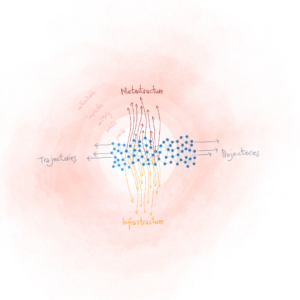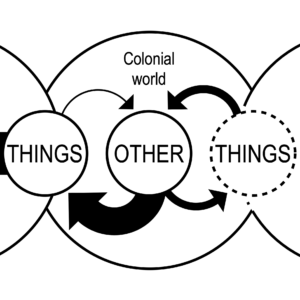coloniality of making
-

Coloniality of Making in Design Philosophy
Van Amstel, Frederick M. C., Gonzatto, Rodrigo F., and Saito, Carmem. Coloniality of Making in Design Philosophy. In: Secomandi, Fernando and Verbeek, Peter-Paul (Eds.). Design Philosophy after the Technology Turn, 41–60. London,: Bloomsbury Visual Arts, 2026. http://dx.doi.org/10.5040/9781350494480.ch-3 - Jan 6, 2026 -
 Abstract: Decolonizing design confronts the deep-rooted structures of colonialism that still shape international aesthetics, production, and trade relationships. The coloniality of making divides “thinking” in developed nations and “making” in underdeveloped ones, generating a nostalgic feeling for colonial styles thought and made for others. By fostering autonomous development and critical consciousness, decolonizing design encourages innovative […] - Feb 16, 2025
Abstract: Decolonizing design confronts the deep-rooted structures of colonialism that still shape international aesthetics, production, and trade relationships. The coloniality of making divides “thinking” in developed nations and “making” in underdeveloped ones, generating a nostalgic feeling for colonial styles thought and made for others. By fostering autonomous development and critical consciousness, decolonizing design encourages innovative […] - Feb 16, 2025 -

Prospective design: A structuralist design aesthetic founded on relational qualities
Botter, F., van Amstel, F. M. C., Mazzarotto Filho, M., and Guimarães, C. (2024) Prospective design: A structuralist design aesthetic founded on relational qualities, in Gray, C., Hekkert, P., Forlano, L., Ciuccarelli, P. (eds.), DRS2024: Boston, 23–28 June, Boston, USA. https://doi.org/10.21606/drs.2024.883 - Jun 17, 2024 -

Anticolonial prospects for overcoming the coloniality of making in design
Saito, C., Freese Gonzatto, R., and van Amstel, F. (2024) Anticolonial prospects for overcoming the coloniality of making in design, in Gray, C., Hekkert, P., Forlano, L., Ciuccarelli, P. (eds.), DRS2024: Boston, 23–28 June, Boston, USA. https://doi.org/10.21606/drs.2024.255 - Jun 17, 2024 -
 Abstract: The never-fulfilling promise of a bright future has justified modern colonization for centuries. Modern design follows suit. Modern design has been exported to former colonies as a neutral, non-political way of making. The futures that came with them have contribute to maintain the coloniality of making, nurturing a sense of nostalgia and a conservative […] - Feb 28, 2024
Abstract: The never-fulfilling promise of a bright future has justified modern colonization for centuries. Modern design follows suit. Modern design has been exported to former colonies as a neutral, non-political way of making. The futures that came with them have contribute to maintain the coloniality of making, nurturing a sense of nostalgia and a conservative […] - Feb 28, 2024 -

El hacer como quehacer: notas para un diseño libre
En América Latina, la colonialidad del hacer nos impide valorar lo que ya hemos hecho y, a partir de ahí, hacer lo que hay que hacer. A menudo preferimos importar el diseño europeo en lugar de construir sobre gambiarras y otras formas populares de diseño. En Brasil, sin embargo, la resistencia a la colonialidad del […] - Apr 21, 2023 -

The coloniality of making and its resistance in Brazil
Summary: The coloniality of making refers to international relations of production that overvalue intellectual labor in developed countries and undervalue manual labor in underdeveloped countries. Design discipline plays a crucial role in maintaining the coloniality of making, establishing hierarchies between modes of designing existence in the world. The colonized populations’ ways of designing are considered […] - Dec 3, 2022 -

Diseño y la colonialidad del hacer
Keynote addressed at the 13th International Conferences on Design History and Studies, Universidad de Bogotá Jorge Tadeo Lozano, October 2022. Resumen: La colonialidad del hacer se refiere a las relaciones internacionales de producción que sobrevaloran el trabajo intelectual en los países desarrollados y subvaloran el trabajo manual en los países subdesarrollados. Al garantizar esta desigualdad […] - Oct 23, 2022 -

Decolonizing whatever-centered design
Centralization is a spatial practice used by human collectives for thousands of years. It started in the archaic definition of village leaders and evolved to world empires, including their corollary transnational companies. Centralization promises to better organize society through the gathering of resources and information generated in a vast territory in a small space: the […] - Jan 19, 2021
